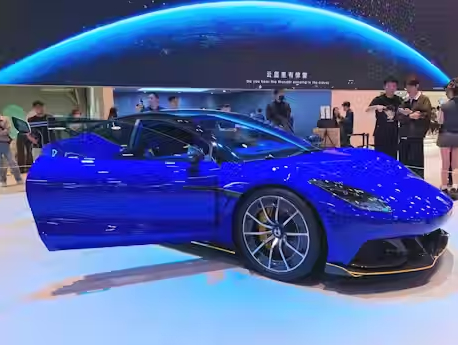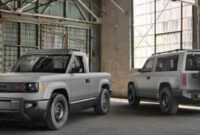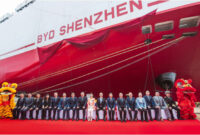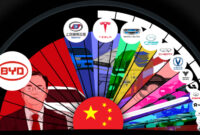Chinese electric vehicle powerhouse BYD has already surpassed long-time leader Tesla in the sales of electrified vehicles. Now, it’s setting its sights on the luxury sports car market.
On Wednesday, BYD’s premium Denza brand introduced the Z, a striking new deep-blue vehicle that reflects the company’s aspirations to compete with high-end Western brands like Porsche and Mercedes-Benz.
The debut coincided with the opening of Auto Shanghai, the largest auto exhibition in China, attracting numerous domestic and international manufacturers and a large number of journalists to an expansive venue in the nation’s financial center.
Prior to its reveal, the Denza Z was covered with a black cloth on the exhibit floor. Surrounded by supporters, Wang Chuanfu, the founder of BYD and a prominent figure in Chinese entrepreneurship, was present at the showcase.
Automakers vied for public attention with eye-catching displays featuring their newest vehicles and competitive press conferences announcing fresh releases. The 10-day event highlights the technological capabilities of China’s rapidly growing and fiercely competitive electric vehicle (EV) industry, which has surprised Western competitors not only with its rapid pace of innovation and expansion but also with the quality of its value propositions.
As the global automotive market faces upheaval due to U.S. President Donald Trump’s tariffs on car imports to the United States, China’s EV industry has emerged as a hotspot, attracting global brands looking to adjust their strategies and build partnerships to reclaim their previous dominance in the world’s largest car market.
BYD clearly leads the EV industry in China, having outpaced Tesla in global sales last year. It continues to enhance its advantage over the American EV company in the domestic market, where most of its vehicles are sold.
On Tuesday, Tesla announced a greater-than-expected decline in quarterly revenue as it confronts challenges, including Trump’s escalating trade conflict and consumer backlash against CEO Elon Musk’s involvement in the administration. Its overall sales dropped by 9%, with the core car sales plummeting by 20%. Net income, viewed as the strictest measure of profitability, fell by 71% compared to the previous year.
The Denza Z has been highly anticipated after prototype images were leaked online earlier this year and an official confirmed that the model would be “maxed out in tech and luxury.”
Initially established over ten years ago as a joint venture with Mercedes, the Denza brand is now entirely owned by BYD and was launched in Europe earlier this month.
While BYD’s main brand is recognized for its more budget-friendly electric and hybrid vehicles, the Denza line demonstrates the company’s ambitions to diversify its offerings and leverage its substantial resources to target other market segments, according to analysts.
“BYD is always on the offensive. Their regular and frequent vehicle and feature introductions keep their competitors on guard, while their lowest-in-class cost structure enables them to price their offerings much more competitively,” said Tu Le, founder and managing director of the consultancy firm Sino Auto Insights, in comments to CNN.
The Denza launch arrives at a difficult time for Porsche, which has struggled to stabilize its declining sales in China, he noted. The German luxury sports car manufacturer reported in its 2024 annual report that its sales in the country dropped by 28% last year compared to 2023, which it attributed to “the ongoing challenging economic situation.”
CNN has contacted BYD for details regarding the pricing of the Denza Z. Last month, the flagship N9 SUV from the high-end Denza line was launched with a starting price of 389,800 yuan ($53,453). In comparison, BYD’s popular Song Plus SUV starts at around $18,500.
BYD also markets luxury electric vehicles under the Yangwang brand, which operates in the high-end 1-million-yuan ($137,000) segment and recently celebrated the sale of its 10,000th vehicle. The latest model, the U8L SUV, was revealed earlier on Wednesday at Auto Shanghai.
BYD is on an upward trajectory
These latest launches follow an already remarkable year for the Shenzhen-based firm. As China’s leading automaker, BYD has set an ambitious goal to double its sales outside of China to over 800,000 vehicles by 2025.
To maintain its cost advantage, BYD plans to produce vehicles in local markets, as indicated by its chairman in a recent earnings call, according to Reuters.
Last year, the European Union imposed significant tariffs on electric vehicle imports from China, citing unfair subsidies present in the Chinese market. A 100% tariff enacted by the previous Biden administration last year effectively blocked Chinese competitors from entering the U.S. market, even prior to the current escalation of tensions between Washington and Beijing.
This year has already seen a series of achievements for the company, which accounted for about one-third of China’s electrified vehicle sales, including hybrids, last year.
Denza, a brand by BYD, is set to launch in the UK, likely starting with the new Z9 GT. This shooting brake clearly draws inspiration from the design of the Porsche Panamera and promises the technology and affordability typically associated with BYD products, but with European aesthetics and an upscale interior to rival established competitors.
We had the opportunity to attend the Denza launch event during Milan Design Week to learn more about the Z9 GT and the brand itself, and we also had the chance to drive a Chinese version of the car during a limited series of handling activities and demonstrations. While many elements will be modified before the car arrives in the UK in 2026, continue reading for our first impressions of the new Z9 GT.
Denza is a completely new brand in Europe that positions itself above the existing BYD lineup and beneath the ultra-luxurious Yangwang brand. It’s intended to compete with German premium brands like Mercedes, Porsche, and Audi, with a lineup expected to include between six and seven models in total. Notably, some of these will be derived from the brand’s Fangchengbao off-road division.
Although the Z9 GT is already available for sale in China, it is a new model for our market. It shares its design with a sedan Denza has no intentions of bringing to Europe, featuring a front end that is understated, a body reminiscent of the Porsche Panamera, and a robust rear. Beneath the surface, the BYD-engineered 800-volt e3 platform offers numerous features alongside impressive performance. Inside, the vehicle boasts a stylish and technologically advanced interior that exceeds any BYD model we’ve encountered, matching the standards of the luxury sector.
What are the specifications?
The Z9 GT utilizes BYD’s e3 platform, including cell-to-body construction for a 32% stiffer chassis, independent rear-wheel steering, and vehicle motion control essentially equivalent to ESC. The rear-wheel steering and individual wheel torque management allow for unique maneuvers like crab walking, but the key specifications are more crucial.
The Z9 GT will come with either BEV or hybrid powertrains: the BEV version employs three motors (308bhp at the front axle and two 322bhp motors at the rear) resulting in a total output of 952bhp in Chinese specification vehicles. Combined with a 101kWh battery, this allows the BEV to achieve 0-62mph in 3.4 seconds and a CLTC range of 391 miles. Expect an EU range of approximately 310 to 340 miles, taking into account WLTP and adjustments for consumers emphasizing range over power.
We sampled a Chinese hybrid model, which shares a significant amount of the EV’s technology but replaces the front motor with a 2.0-liter turbocharged four-cylinder engine and a 38.5kWh battery. The internal combustion engine produces 268bhp and 232ft lbs of torque, working with two 295bhp rear motors to generate a total of 858bhp, achieving 0-62mph in 3.6 seconds according to Chinese specifications. This system functions as a range extender at lower speeds (below 62mph) and switches to a traditional hybrid model at higher speeds.
In February, BYD introduced the “God’s Eye,” an advanced driver-assistance system that competes with Tesla’s Full Self-Driving feature, at no additional cost for most models in China. Last month, the company revealed a rapid battery charging technology that it claims provides 250 miles of range in just five minutes, surpassing Tesla’s Superchargers, which require 15 minutes to add 200 miles.
The competitiveness and speed of the Chinese market was highlighted recently when Contemporary Amperex Technology (CATL), the world’s leading producer of electric vehicle batteries, announced an enhanced battery that promises an even greater range of 320 miles, outdoing rival BYD’s state-of-the-art technology.
BYD noted a 60% increase in sales during the first quarter of this year, selling just over one million new-energy vehicles within the first three months of 2025, encompassing battery-operated cars, hybrids, and commercial vehicles, as per a CNN assessment based on its latest stock exchange report.
The company achieved $107 billion in sales for 2024, reflecting a 29% increase from the previous year, with 4.27 million cars delivered, including hybrids. In comparison, Tesla reported $97.7 billion in revenue for 2024 and delivered 1.79 million battery-only vehicles. For the first time last year, Tesla experienced a decline in annual deliveries of 1.1%.
Tesla accounted for a 6.1% share of the domestic market, according to the China Passenger Car Association. While Tesla exclusively manufactures fully electric battery-powered vehicles, BYD produces both battery-operated vehicles and hybrids. Its shipments of battery-powered EVs reached 1.76 million vehicles, which was just shy of Tesla’s numbers.



